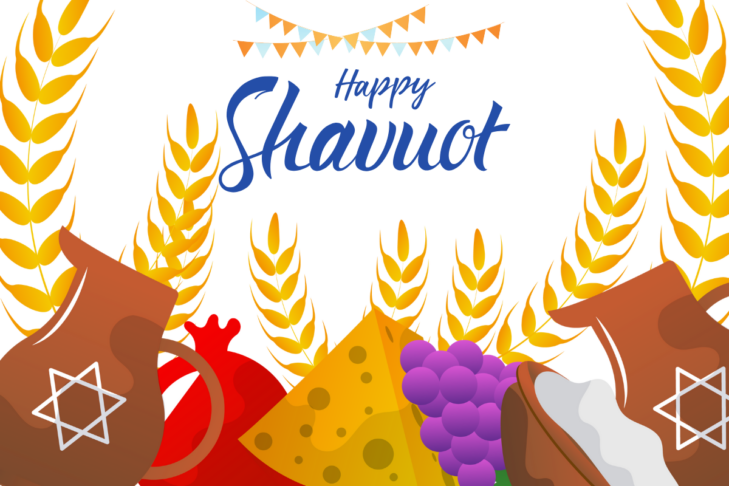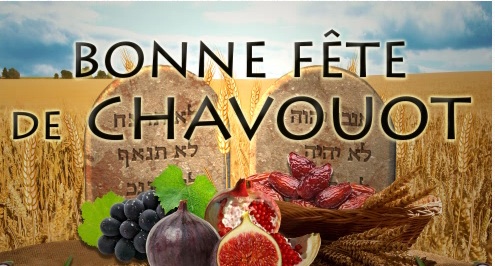Hi Bonjour / Hello [nickname_else_first_name]

Shavuot ( listen (help·info)), or Shavuos (
listen (help·info)), or Shavuos ( listen (help·info)) in some Ashkenazi usage (Hebrew: שָׁבוּעוֹת, Šāvūʿōṯ, lit. "Weeks"), commonly known in English as the Feast of Weeks, is a Jewish holiday that occurs on the sixth day of the Hebrew month of Sivan (it may fall between May 15 and June 14 on the Gregorian calendar). In the Bible, Shavuot marked the wheat harvest in the Land of Israel (Exodus 34:22). In addition, Orthodox rabbinic traditions teach that the date also marks the revelation of the Torah to Moses and the Israelites at Mount Sinai, which, according to the tradition of Orthodox Judaism, occurred at this date in 1314 BCE.[2]
listen (help·info)) in some Ashkenazi usage (Hebrew: שָׁבוּעוֹת, Šāvūʿōṯ, lit. "Weeks"), commonly known in English as the Feast of Weeks, is a Jewish holiday that occurs on the sixth day of the Hebrew month of Sivan (it may fall between May 15 and June 14 on the Gregorian calendar). In the Bible, Shavuot marked the wheat harvest in the Land of Israel (Exodus 34:22). In addition, Orthodox rabbinic traditions teach that the date also marks the revelation of the Torah to Moses and the Israelites at Mount Sinai, which, according to the tradition of Orthodox Judaism, occurred at this date in 1314 BCE.[2]
The word Shavuot means "weeks", and it marks the conclusion of the Counting of the Omer. Its date is directly linked to that of Passover; the Torah mandates the seven-week Counting of the Omer, beginning on the second day of Passover, to be immediately followed by Shavuot. This counting of days and weeks is understood to express anticipation and desire for the giving of the Torah. On Passover, the people of Israel were freed from their enslavement to Pharaoh; on Shavuot, they were given the Torah and became a nation committed to serving God.[3]
- Wikipedia
Traditionally our community eats dairy only during the holiday of Shavouot
Table of contents
1) Perashat Shavuot - Rabbi Eli Mansour
2) Halakhat Hahag - the Meaning of Shavuot - Hazzan David Azerad
3) Holy Jokes!
4) FOR KIDS!

1)PERASHAT HASHAVOUA
This Week's Parasha Insight with Rabbi Eli Mansour
Shavuot- Celebrating the Eternal Torah
The Gemara in Masechet Shabbat (88a) cites the following enigmatic pronouncement made by an anonymous sage: "Blessed is the Compassionate One who gave the triple Torah to the triple nation through the third, on the third day, in the third month."
This Rabbi points to the prominence of the number 3 in the context of Matan Torah. The written text of the Torah itself consists of three portions – Torah, Nebi’im and Ketubim. The nation that received the Torah, Am Yisrael, consists of three groups – Kohanim, Leviyim and Yisraelim. The Torah was brought to us by Moshe, the third of three siblings (he had an older brother and sister – Aharon and Miriam). The Torah was given to us after the "Sheloshet Yemeh Hagbala" – the three days of separation, and during the third month, the month of Sivan (as Nissan is considered the first month in several respects).
What is the significance of the number three in regard to the Torah? Why was this unnamed Rabbi moved to express special praise to Hashem because all the "3s" that are featured in the process of Matan Torah?
An important and meaningful explanation of this remark is offered by the great Kabbalist and Posek Hacham Ovadia Hedaya (Aleppo, Syria – Jerusalem, 1889-1969), in the introduction to his work Yaskil Abdi. He notes that in Halacha, something that is repeated three times creates a "Hazaka" – a condition that can presumed to be permanent. Once something occurs three times, it is assumed to be enduring. The Gemara applies this concept to Torah scholarship, as well, teaching us in Masechet Baba Mesia (85a), "Anyone who is a Torah scholar, and his son is a Torah scholar, and his grandson is a Torah scholar – then Torah will never cease from his offspring, forever." Three consecutive generations of Torah learning guarantee that Torah will remain in that family for eternity. The Gemara cites as the source for this concept a verse in the Book of Yeshayahu (59:21) in which G-declares, "And My words which I have placed in your mouth – they shall not leave from your mouth, from your offspring’s mouth, or the mouth of your offspring’s offspring, forever and ever." Once Torah scholarship is attained by three generations, it remains in place for all time.
The Rabbi cited by the Gemara praises G-d for giving us a permanent Torah, a Torah which is everlasting. The number 3 is associated with Matan Torah to teach us that Torah has a "Hazaka" – it is eternal, and will always remain with us. Everything else comes and goes. Cultural fads and popular ideas and habits do not last. Eventually, sooner or later, they go out of style. Torah, however, is eternal. It is the one constant that has remained and will always remain throughout human history. The Rabbi cited by the Gemara thus praises Hashem for the great privilege that we have – to have been given an eternal Torah.
On Shabuot, we celebrate and recommit ourselves to the belief of the Torah’s eternal quality. We were chosen to receive this most precious commodity – a system of values and ideals that is everlasting. Only Torah has passed, and will always continue to pass, the test of time. This is what makes the Torah such a special and unique gift, and worthy of our ongoing, unconditional and enthusiastic commitment and devotion.
Youtube Video: Rabbi Mansour preparing for Shavuot

2) HALAKHAT HASHAVOUA
Selected & translated by David Azerad, Hazzan Maghen Abraham
BONUS HALACHA
There are four names for the festival of Shavuot:
- Shavuot, as we read: “Then you shall observe the Festival of Weeks (Ḥag Shavuot) for the Lord your God” (Devarim 16:10).
- The Harvest Festival (Ḥag Ha-katzir), as we read: “the Festival of the Harvest, of the first fruits of your work, of what you sow in the field” (Shemot 23:16).
- The Day of the First Fruits (Yom Ha-bikurim), as we read: “on the day of the first fruits, your Festival of Weeks, when you bring an offering of new grain to the Lord” (Bamidbar 28:26).
- The Gathering (Atzeret), the festival’s name in rabbinic literature.
We will begin by explaining its primary name – Shavuot.
The timing of Shavuot is unique. All other festivals have a defined date – Pesaḥ starts on the fifteenth of Nisan, Rosh Ha-shana on the first of Tishrei, Yom Kippur on the tenth of Tishrei, and Sukkot on the fifteenth of Tishrei. However, Shavuot has no assigned date. Its date is dependent upon Sefirat Ha-omer. The omer offering was brought on the second day of Pesaḥ. From that day, we count seven weeks, for a total of 49 days. The following day (the fiftieth) is celebrated as Shavuot. Thus we read: “And from the day on which you bring the sheaf (omer) of elevation offering – the day after the Sabbath – you shall count off seven weeks. They must be complete: you must count until the day after the seventh week – fifty days, then you shall bring an offering of new grain to the Lord” (Vayikra 23:15-16). Similarly, we read: “You shall count off seven weeks; start to count the seven weeks when the sickle is first put to the standing grain. Then you shall observe the Festival of Weeks for the Lord your God” (Devarim 16:9-10). True, nowadays Shavuot is always on the sixth of Sivan, but this is because we have a set calendar. In the past, when rabbinic courts were comprised of properly ordained judges (musmakhim), they would sanctify the new moon, determining Rosh Ḥodesh based on testimony as to the moon’s appearance. Under those circumstances, the festival was sometimes celebrated on the fifth or seventh of Sivan.
Accordingly, the timing of Shavuot depends upon the timing of Pesaḥ. The implication is that only by starting with Pesaḥ can we get to Shavuot and the giving of the Torah. Two interconnected principles were revealed on Pesaḥ – the Jewish people’s uniqueness, and simple faith (emunah peshuta). When God chose Israel as His special nation, smote the Egyptians, and led His nation to freedom, He demonstrated that there is a Creator Who runs the world. Jews have this simple faith. However, for this faith to reach its full expression and allow us to help the world progress toward redemption, we need the Torah as well, for it contains the values, commandments, and guidance necessary to perfect the world. This is the meaning of what we say in the berakhot in the Torah: “Who chose us from among all the nations” refers to Pesaḥ, while “and gave us His Torah” refers to Shavuot. Without the natural and basic Jewish faith revealed on Pesaḥ, it would be impossible to arrive at the deep and complex faith represented by Shavuot. Conversely, our natural faith and our uniqueness could not survive without the Torah given on Shavuot (see Peninei Halakha: Pesaḥ 1:1 and Zemanim 2:1-2).
God gave us the festivals of Pesaḥ and Shavuot so that we may relive the miraculous events of the Exodus, and to once again remind us of the uniqueness of the Jews and simple faith. These realizations allow us to use the time period of Sefirat Ha-omer to gradually ascend to the sacred day on which the Torah was given, when our faith becomes whole and complete. Each year we are able to rise higher and higher. Ultimately, the whole world will be filled with righteousness and justice, mercy and compassion, and the land will be filled with the knowledge of God.
Chag Shavuot Sameach
David Azerad
3) HOLY JoKeS!!
Selection of funny snippets, loosely related to this weeks parashah, to brighten your day
Q. What kind of man was Boaz before he married?
A. Ruth-less.
Q. Which servant of G-d was the most flagrant lawbreaker in the Bible?
A. Moses. He broke all 10 commandments at once.
Q. Did you know it’s wrong for a woman to make coffee? Yup, it’s in the Bible. It says . . .
A. “He-brews”
Q: Where is medicine first mentioned in the Bible?
A: When God gave Moses two tablets.
Q: What do you call cheese that is sad?
A: Blue cheese.
Q. Which hotel serves the best cheese?
A: The Stilton
Q: Why does cheese look sane?
A: Because everything else on the plate is crackers.
Q. What does a cheese say on Shavuot?
A: Have E-dam good day!
Q. What type of cheese is made backwards?
A. EDAM.
Q. After Shavuot we all need to go on diet. Why?
A. To cheddar a few pounds.


FOR KIDS!
|
Click on the image to open the youtube video


|
|
|












